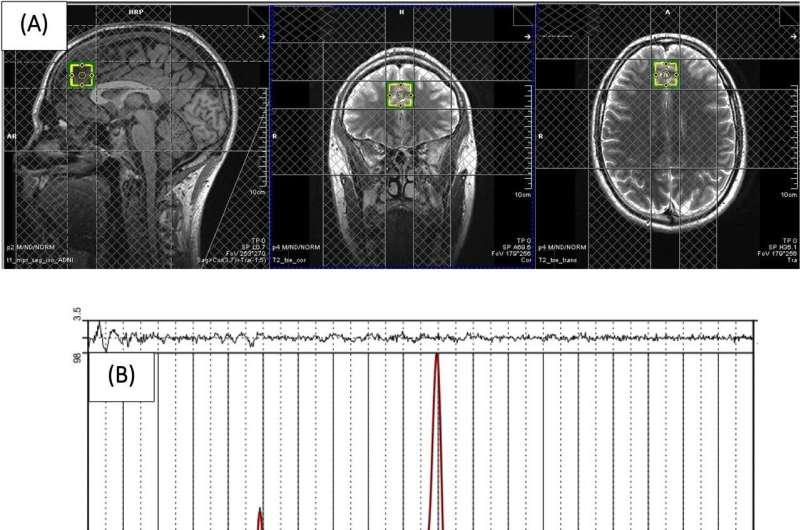
(A) Example of 1H-MRS voxel placement in the mPFC (sagittal, coronal, and axial orientations) (B) 1H-MRS spectrum obtained from the voxel in A (black line) and the overlay of the spectral fit (red line). Credit: Nutritional neuroscience (2024). DOI: 10.1080/1028415X.2024.2355603
A first-of-its-kind study into brain chemistry and structure and diet quality in 30 volunteers shows that eating a poor-quality diet can lead to brain changes linked to depression and anxiety.
Brain scans show changes in neurotransmitters and gray matter volume in people who eat a poor diet, compared to those who eat a Mediterranean diet, which is considered very healthy. The researchers also found that these changes are linked to rumination, part of the diagnostic criteria for conditions that affect mental health, such as depression and anxiety.
This research was carried out by the University of Reading, Roehampton University, FrieslandCampina (Netherlands) and Kings College London, and is published in Nutritional neuroscience.
When someone eats a poor-quality diet, there is less gamma-aminobutyric acid (GABA) and increased glutamate (both neurotransmitters, along with reduced gray matter volume) in the front part of the brain. This could explain the connection between what we eat and how we feel.
Dr. Piril Hepsomali, University of Reading, said: “We can eat ourselves well! Ultimately, we see that people who eat an unhealthy diet – high in sugar and saturated fat – have an unbalanced excitatory and inhibitory neurotransmission, as well as a reduced volume of neurotransmission. gray matter in the front part of the brain has been implicated in mental health problems such as depression and anxiety.”
The exact reason diet affects the brain in this way is still under investigation. It is possible that obesity and diets high in saturated fats cause changes in glutamate and GABA metabolism and neurotransmission, as has been shown in animal studies.
Marked changes in the gut microbiome, resulting from diets high in saturated fats, are thought to impact the cell machinery that controls both GABA and glutamate production.
A high saturated fat, high sugar diet has also been shown to reduce the number of parvalbumin interneurons, which perform the role of delivering GABA where it is needed.
An unhealthy diet also affects glucose levels, causing blood glucose and insulin to rise. This increases glutamate in the brain and plasma, reducing GABA production and release. Having a diet high in fat and cholesterol can cause changes in cell membranes that also alter the release of neurotransmitters.
These changes in brain chemistry can lead to changes in the volume of gray matter in the brain, as observed in this study.
Dr. Hepsomali continued: “I would like to note that GABA and glutamate are also intimately involved in appetite and food intake. Decreased GABA and/or increased glutamate can also be a driving factor in making unhealthy food choices. So there may be a circular relationship between eating well, healthier brains and better mental well-being, and making better food choices to eat well.”
More information:
Piril Hepsomali et al., Adherence to unhealthy diets is associated with altered frontal gamma-aminobutyric acid and glutamate concentrations and gray matter volume: preliminary findings, Nutritional neuroscience (2024). DOI: 10.1080/1028415X.2024.2355603
Quote: Researchers find poor-quality diet may lead to brain changes linked to depression and anxiety (2024, June 5), retrieved June 5, 2024 from https://medicalxpress.com/news/2024-06- poor-quality-diet-brain-depression.html
This document is copyrighted. Except for fair dealing purposes for the purpose of private study or research, no part may be reproduced without written permission. The content is provided for informational purposes only.
 Healthy Famz Healthy Family News essential tips for a healthy family. Explore practical advice to keep your family happy and healthy.
Healthy Famz Healthy Family News essential tips for a healthy family. Explore practical advice to keep your family happy and healthy.


